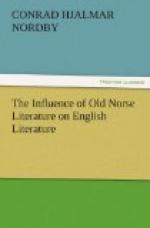The opening lines are a good model of the meter, and we find it different from any that we have considered so far. There are certain peculiarities about it that make it seem a perfect medium for translating the Old Norse spirit. Most of these peculiarities are in the opening lines, and so we may transfer them to this page:[32]
There was a dwelling of Kings ere
the world was waxen old;
Dukes were the door-wards there, and the roofs
were thatched with gold;
Earls were the wrights that wrought it, and silver
nailed its doors;
Earls’ wives were the weaving-women, queens’
daughters strewed its
floors,
And the masters of its song-craft were the mightiest
men that cast
The sails of the storm of battle adown the bickering
blast.
Everybody knows that alliteration was a principle of Icelandic verse. It strikes the ear that hears Icelandic poetry for the first time—or the eye that sees it, since most of us read it silently—as unpleasantly insistent, but on fuller acquaintance, we lose this sense of obtrusiveness. Morris, in this poem, uses alliteration, but so skilfully that only the reader that seeks it discovers it. A less superb artist would have made it stick out in every line, so that the device would be a hindrance to the story-telling. As it is, nowhere in the more than nine thousand lines of Sigurd the Volsung is this alliteration an excrescence, but everywhere it is woven into the grand design of a fabric which is the richer for its foreign workmanship.
Notice that duke and battle and master are the only words not thoroughly Teutonic. This overwhelming predominance of the Anglo-Saxon element over the French is in keeping with the original of the story. Of course it is an accident that so small a proportion of Latin derivatives is found in these six lines, but the fact remains that Morris set himself to tell a Teutonic story in Teutonic idiom. That idiom is not very strange to present-day readers, indeed we may say it has but a fillip of strangeness. Archaisms are characteristic of poetic diction, and those found in this poem that are not common to other poetry are used to gain an Old Norse flavor. The following words taken from Book I of the poem are the only unfamiliar ones: benight, meaning “at night”; “so win the long years over”; eel-grig; sackless; bursten, a participle. The compounds door-ward and song-craft are representative of others that are sprinkled in fair number through the poem. They are the best that our language can do to reproduce the fine combinations that the Icelandic language formed so readily. English lends itself well to this device, as the many compounds show that Morris took from common usage. Such words as roof-tree, song-craft, empty-handed, grave-mound, store-house, taken at random from the pages of this poem, show that the genius of our language permits such formations. When Morris carries the practice a little further, and makes for his poem such words as door-ward, chance-hap, slumber-tide, troth-word, God-home, and a thousand others, he is not taking liberties with the language, and he is using a powerful aid in translating the Old Norse spirit.




